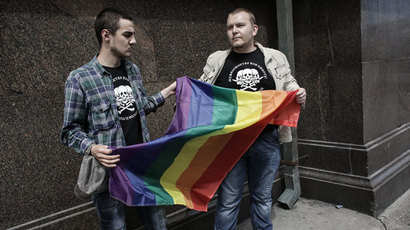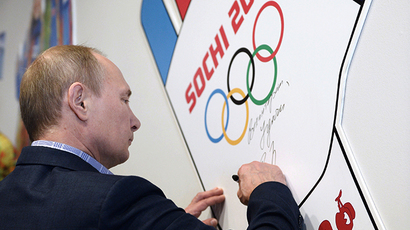Media hype around propaganda law has ‘negative effect’ on Russian LGBT community
The Western media’s response to Russia’s law banning gay propaganda among minors is “heavy-handed”, members of Sochi’s gay community have told RT. They worry excessive media attention may lead to Russian society blaming them for “spoiling the Olympics.”
Russia’s legislation banning so-called homosexual propaganda among minors has dominated the world’s press in the run up to the Sochi winter Olympics. LGBT communities throughout the world have decried the law as discriminatory and called for a boycott on this year’s Olympics.
The Russian government has sought to allay fears that visitors to Olympics in Sochi will be discriminated against, pledging the law will not apply to guests and participants during the Games. However, members of the LGBT and rights groups have criticized the Olympic Committee for not doing more to force the Russian government to repeal the law.
Meanwhile in Sochi, members of the LGBT community have voiced concerns that western media coverage of the law may have a negative effect on gay people in Russia.
“I think it's really bad, it negatively affects gay Russian people, because society blames them for spoiling the Olympics,” said the owner of one of Sochi’s gay clubs, Andrey Tanychev, to RT correspondent Martyn Andrews. Stressing that he does not agree with the law, Tanychev said the gay community in Russia has largely been unaffected by the new legislation.
Both he and his partner believe that the handling and publicity
of the law by the Western press has been “heavy-handed.”
Campaigners against the legislation claim that the law has led to
an increase in attacks on members of the LGBT community in
Russia.

Answering questions regarding the law, Russian President Vladimir Putin said that none of the guests in Sochi would have any problems and members of the LGBT community were “welcome” at the Olympics.
“People have different sexual orientation. We would welcome all athletes and all guests at the Olympics,” said the President at a press conference in January. He added that he would not like the Games in Sochi to be “marred by politics.”
Members of Russia’s Orthodox Church – which advocates the bill – have made calls to further legislate against homosexual minorities and reintroduce criminal liability for homosexuality. Putin assured the state was separate from the Church and no such legislation would be passed.
Russia remains a largely conservative country, with the majority of the population fostering homophobic views. In a Levada Public Opinion Center poll around 85 percent of adult Russians said they were strongly against a law that would allow same-sex marriage, and 87 percent said they opposed the idea of holding regular gay pride events in their cities.













